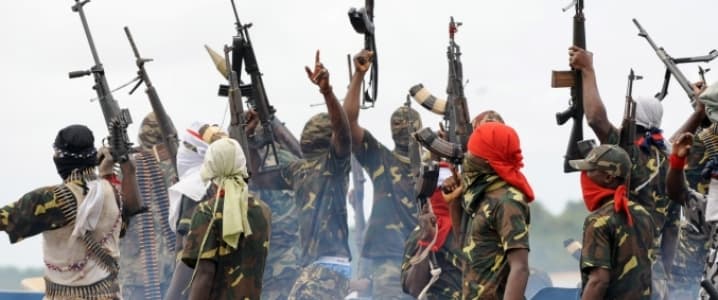Political risk has always been a part of oil business, and today’s situation in Nigeria is no exception. Over the past several months the insurgency in the Niger River delta has devastated the Nigerian oil industry, with the country’s production being halved from 2.2 to 1.4 million barrels per day. The severity of attacks not only affected Nigeria’s oil production, but also the global markets. Accordingly, Angola has surpassed Nigeria as Africa’s largest oil producer while global oil prices have hiked to $49 per barrel.
(Click to enlarge)
The on-going armed insurgency is a direct result of the government’s decision to cut subsidies for former rebel soldiers who were involved in a similar conflict that ended in 2009. But the root of the current rebellion against the government of President Muhammadu Buhari and the Nigerian federal state is a combination of long-standing social and economic grievances that have beset the region ever since oil production began in the late 1950s. Related: Dollar Weakness Fails To Stimulate Oil Prices
The Nigerian oil industry is plagued with endemic corruption. In the latest scandal involving the Nigerian National Petroleum Corporation (NNPC), the country’s official audit revealed that around $19 billion of oil revenues went missing through corruption and oil theft in 2014 alone. According to some estimates, around $400 billion has vanished in a similar fashion since the country gained independence in 1960, making oil industry crime the second largest industry in the country, right after the oil industry itself. It is estimated that around 200,000 barrels a day are stolen by a sophisticated network of former warlords, local businessmen, and corrupt officials.
Religious division in Nigeria

Source: The Economist
Pollution is another chronic problem that stirs tensions between the domestic population, the government, and the oil industry. The Nigerian government counted more than 7000 oil spills between 1970 and 2000, and according to data collected by Shell, 1693 oil spills have occurred since 2007, with the latest major incident involving 14,000 tonnes of crude oil in the Niger river in 2009.
Nigeria is relying heavily on oil exports to boost state coffers, and the production cuts will come as an additional headache for an economy that has already suffered from a prolonged period of low oil prices. Related: Against All Odds, Russia Plans to Boost Oil Production by 185,000 Bpd
Since the sharp drop in oil prices began in 2014, Nigeria has been going through a difficult period of adjustment. Crude oil makes up more than 90 percent of exports and 70 percent of state revenues, but despite being a net exporter of crude oil, the country imports most of the oil consumed domestically because the inefficient refinery system is unable to meet demands.
(Click to enlarge)
After years of deliberation, this year the government finally abolished the broken fuel subsidy system that was draining $2.7 million of public finances per day and threatened to severely deplete the country’s hard currency reserves, which have already decreased by 33 percent in the last two years.
As a result, petrol prices rose by 67 percent. Although the price increase was necessary, without simultaneous devaluation of the national currency, the measure may boost inflation, curb liquidity and put additional pressure on the Nair, which is already trading 30 percent below the official rate in the black market.
Part of the problem also lies in President Buhari’s efforts to crush the rampant corruption and put Nigeria’s oil industry in order. Considering the ethnic and religious divisions between the Christian South and the Muslim North, his Muslim background might be seen in the Christian-dominated Niger Delta as another example of mistreatment of local communities by the central government in Abuja – thus aggravating old animosities that have beset the country for decades. Alongside the current economic problems, this toxic mixture might prove to be a difficult test for Nigeria’s government in the future.
By Ante Batovic via Globalriskinsights.com
More Top Reads From Oilprice.com:
- Scotland Bans Fracking, Forever
- Iran Eyes $185 Billion In Foreign Investment With New Contracts
- Why $50 Oil Makes Sense



















